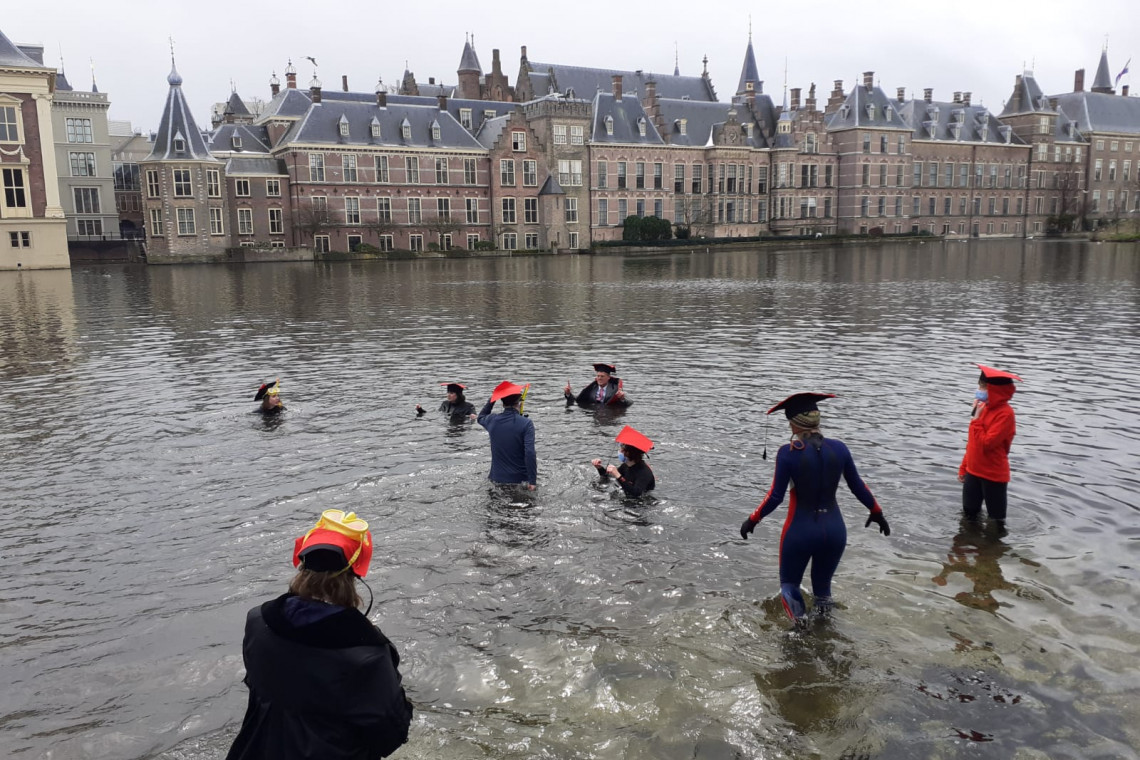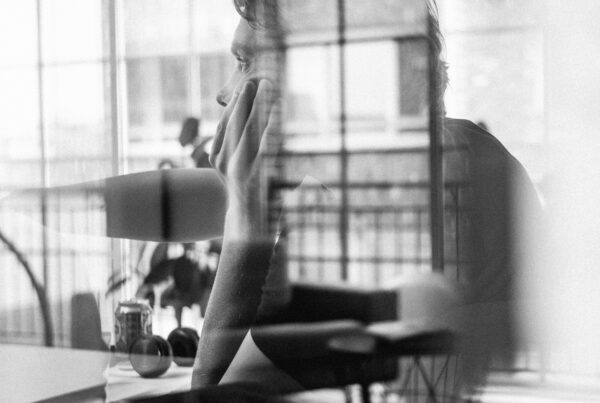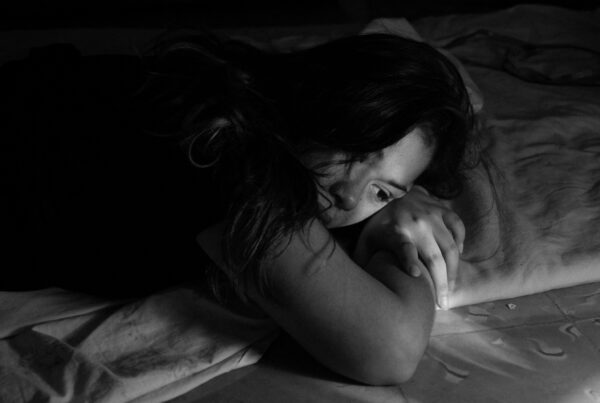
‘Such a nice Olympic summer,’ Marcel Levi, the new president of the Dutch science organization NWO must have thought (Levi, 2021). ‘Must be the perfect time for a column comparing Science to competitive sports.’ Dutch science was not amused with his opinion article on how competition brings out the best in science. The column caused quite an uproar and gained attention for an ongoing debate about how we can foster a more stimulating environment for science in the Netherlands.
‘Such a nice Olympic summer,’ Marcel Levi, the new president of the Dutch science organization NWO must have thought (Levi, 2021). ‘Must be the perfect time for a column comparing Science to competitive sports.’ Dutch science was not amused with his opinion article on how competition brings out the best in science. The column caused quite an uproar and gained attention for an ongoing debate about how we can foster a more stimulating environment for science in the Netherlands.

Photo by Hoger Onderwijs Persbureau

Photo by Hoger Onderwijs Persbureau
One of the things about Mr Levi’s column is that the timing was… well, rather insensitive. A mere three months before, Dutch scientists protested before the Dutch parliament (NOS, 2021). By jumping into the local pond, the Hofvijver, they communicated that “the water is up to our lips.” Their message was that Dutch science is heavily underfunded and the work pressure is too high. As a result, the quality of research and education are suffering, and so are the scientists themselves. As one of them puts it: Science is like competitive sports. You can’t do them for a very long time, and neither of them is good for your health (Dingemanse 2014).
In saying that Dutch science can be a very competitive environment, Mr Levi was probably right. However, we might wonder if science should be this competitive, as this competition has many drawbacks. In fact, research might benefit if Dutch science were a little less like competitive sports.
One of the disadvantages of competition is that it can waste a lot of time and money. For example, researchers may spend months writing a research proposal, but few actually receive a grant. In 2020, NWO received 7098 applications for research grants, of which 1778 (25%) were awarded (Rathenau Instituut, 2021). For the prestigious Veni scholarship, just 14% of applicants were successful (NWO, 2020). A mathematician calculated that the application procedure for the even more prestigious Vici scholarship cost applicants and review board members a total of 2600 full time weeks, or about 12 million euros (Smeets, 2016). When it comes to the jobs themselves, the picture may be even darker: Only about a quarter of PhD graduates can stay on as a postdoc after their promotion, and whereas ‘85% of academic postdocs would like to stay on at the university, only 3% of them received a permanent contract’ (Van der Wijk, 2021). Such fierce competition might be a massive stressor — and a waste of time, money and talent that could instead be spent on doing actual research.
“Who is to decide what makes good science?”
Another problem with the competitive manner in which research grants are given, is that it may be very arbitrary. Who is to decide what makes good science? As a former review board member (Van der Does, 2021) put it: if there are fifty proposals for ten grants, it will be quite clear which five applications are excellent, and which ten are not great research. But which of the middle 35 applications should receive one of the five remaining grants? Such an arbitrary procedure may put scientists of a minority background at a disadvantage, and thus harm diversity in science in the long run (Van der Hee, 2021). Moreover, only scientists with an entrepreneurial mindset, who are able to ‘sell’ their research will have a chance at receiving a grant. In addition, certain kinds of research are also more likely to receive funding. Research proposals that are thought out into the tiniest details or are about the hot topics of the day (‘relevant’) are most likely to win a grant (Van der Hee, 2021), and applied research is more likely to receive funding than fundamental research (VNO-NCW, 2020). However, the applications of the future may very well rest on fundamental research of today (VNO-NCW, 2020), or research that was conducted ‘just because it’s interesting.’ For example, the scientists behind the Janssen-vaccine almost stopped their research some years ago because of a lack of funding for research into coronaviruses (Sleutelstad, 2021). Had they discontinued their project, we might have had one vaccine less today to protect ourselves against covid.
In terms of operational conditioning: if you are going to ignore some (good) research (negative punishment), and are going to fund other projects (positive reinforcement), what kind of behaviour are you going to get? Not very nice behaviour at all, as it turns out. Researchers concluded that the current situation may harm research integrity (Van der Hee, 2021). According to one of them, Jeannette Pols, the stereotypical fraudulent scientists are hardly ever “‘odd people’ who mean bad and therefore fake their data.” Rather, they are sloppy scientists, who know there are some inaccuracies in their data, but have to move on because of time pressure (Van der Hee, 2021). The fierce competition may also harm social safety at research departments. Worse, it may even motivate researchers to sabotage their ‘competitors’ or hinder the peer review process (Crone, Ellemers, Mesman, Sluiter, 2021). One in five PhD students in the Netherlands face unwanted behaviour on their work including actions harming the integrity of their research, discrimination and sexual intimidation (Angholt & Polack, 2021). Not all of this behaviour may be related to how competitive Dutch science can be, but the competition may make it even harder for young scientists to say no or ask for help when faced with such unwanted behaviour, because they fear it may harm their chances of staying on at the university after their contract ends (Bouma, 2021; Angholt & Polack, 2021).
“In the competitive atmosphere of Dutch science, the water may be up to the lips of researchers.”
Meanwhile, there are many suggestions on how these problems of Dutch science could be solved. Een nieuw academisch peil, the action group who jumped into the Hofvijver this year, are asking for 1.1 billion euros extra to solve the financial problems of Dutch universities (NOS, 2021). Other suggestions would be to give more research funding directly to universities rather than to have scientists compete for them (Van der Hee, 2021; Van der Does, 2021), and to divide the biggest and most prestigious grants into a larger number of smaller grants, so more scientists can get a piece of the cake (Van der Does, 2021). One slightly unorthodox suggestion that might nevertheless be worth considering would be to make the arbitrariness of research grant decisions more explicit: Instead of deciding which projects should get the grant, review boards could merely decide which research proposals are decent enough. A lottery for the funding can then be held among all the worthy applicants (Van der Maas, 2018; Van der Does, 2021; Smeets, 2016). In the competitive atmosphere of Dutch science, the water may be up to the lips of researchers. But if different decisions were made, we could keep them from drowning in an Olympic-size pool. <<
References
– Angholt, R., & Polack, M. (2021, 17 September). De stille crisis in te wetenschap – Jonge onderzoekers bedanken voor een wetenschappelijke carrière. Scienceguide. Retrieved 29 september 2021 from: https://www.scienceguide.nl/2021/09/de-stille-crisis-in-de-wetenschap/
– Bouma, K. (2021, 3 september). ‘Jonge academici vrezen voor hun contract als ze hun grenzen aangeven.’ De Volkskrant. Retrieved 29 september 2021 from: https://www.volkskrant.nl/wetenschap/jonge-academici-vrezen-voor-hun-contract-als-ze-hun-grenzen-aangeven~b27aeabb/
– Crone, E., Ellemers, N., Mesman, J., & Sluiter, I. (2021, 27 July). Rivaliteit doet de wetenschap geen goed. NRC Handelsblad. Retrieved 29 september 2021 from: https://advance-lexis-com.proxy.uba.uva.nl/document/?pdmfid=1516831&crid=080ae4d4-c2e5-4508-9758-e6d01deeb8b8&pddocfullpath=%2Fshared%2Fdocument%2Fnews%2Furn%3AcontentItem%3A637G-88W1-JCMP-211X-00000-00&pdcontentcomponentid=259064&pdteaserkey=sr0&pditab=allpods&ecomp=yzvnk&earg=sr0&prid=a13271a8-6e18-42b0-b265-2105ba8132f7
– Dingmans, M. (2021, July 14). Twitter thread reacting to Marcel Levi’s article. Retrieved 29 september 2021 from: https://twitter.com/DingemanseMark/status/1415389453665849344
– Levi, M. (2021). Science is like competitive sports. Onderzoek (7) 2. Retrieved 29 september from: https://www.nwo.nl/en/science-competitive-sports
– NOS (2021, 6 April). Academici over geldgebrek: ‘Ik ben er klaar mee, ik ga iets anders doen’. Nederlandse Omroep Maatschappij. Retrieved 29 september from https://nos.nl/artikel/2375687-academici-over-geldgebrek-ik-ben-er-klaar-mee-ik-ga-iets-anders-doen
– Nederlandse Wetenschaps Organisatie. (2020). NWO-Veni van 250.00 euro voor 161 onderzoekers. Retrieved 29 september 2021 from: https://www.nwo.nl/nieuws/nwo-veni-van-250000-euro-voor-161-onderzoekers
– Rathenau Instituut (2021). Honoreringspercentages NWO. Retrieved 29 september 2021 from: https://www.rathenau.nl/nl/wetenschap-cijfers/werking-van-de-wetenschap/excellentie/honoreringspercentages-nwo
– Sleutelstad, (2021, 15 march). Leids onderzoek dat aan basis lag van coronavaccin ‘was bijna gestopt’. Sleutelstad. Retrieved 29 september 2021 from: https://sleutelstad.nl/2021/03/15/leids-onderzoek-dat-aan-basis-lag-van-coronavaccin-was-bijna-gestopt/
– Smeets, I. (2016, 20 february). Verwerken Vici-aanvragen kost miljoenen, en dat is zonde. De Volkskrant. Retrieved 29 september 2021 from: https://advance-lexis-com.proxy.uba.uva.nl/document/?pdmfid=1516831&crid=06b1ed14-a7f0-4e75-92cd-32cc0a544522&pddocfullpath=%2Fshared%2Fdocument%2Fnews%2Furn%3AcontentItem%3A5J4B-9W61-DYRY-N1R3-00000-00&pdcontentcomponentid=259070&pdteaserkey=sr1&pditab=allpods&ecomp=yzvnk&earg=sr1&prid=45472bd6-9a8c-49f3-94eb-02e256491215 (https://www.volkskrant.nl/nieuws-achtergrond/verwerken-vici-aanvragen-kost-miljoenen-en-dat-is-zonde~be7b6184/)
– Van der Wijk, A-E. (2021). Braindrian. DNA (6) 10.
– Van der Does, W. (2021). Wetenschap als topsport. Retrieved 29 september 2021 from: https://www.dousa.nl/2021/07/31/wetenschap-als-topsport/
– Van der Maas, H. (2018, 2 may). Een pleidooi voor het toeval – Ook onderzoekssubsidies kun je het beste via een gewogen loting verdelen. Scienceguide. Retrieved 29 september 2021 from: https://www.scienceguide.nl/2018/05/een-pleidooi-voor-het-toeval/
– Van der Hee, S. (2021, 9 September). Uva-onderzoek: integriteit bedreigd door huidige wetenschapspraktijk. Folia. Retrieved 29 september 2021 from: https://www.folia.nl/actueel/147275/uva-onderzoek-integriteit-bedreigd-door-huidige-wetenschapspraktijk
– VNO-NCW (2020). Ben Feringa: ‘Fundamenteel onderzoek is belangrijk voor de toekomst’. Forum. Retrieved 29 september 2021 from: https://advance-lexis-com.proxy.uba.uva.nl/document/?pdmfid=1516831&crid=27615bd2-1b14-4d51-b61a-dd4110338faf&pddocfullpath=%2Fshared%2Fdocument%2Fnews%2Furn%3AcontentItem%3A61DG-Y3J1-F07K-D17T-00000-00&pdcontentcomponentid=149015&pdteaserkey=sr0&pditab=allpods&ecomp=yzvnk&earg=sr0&prid=940ce28e-2ab1-46a5-8f8c-0e6719e4d072
One of the things about Mr Levi’s column is that the timing was… well, rather insensitive. A mere three months before, Dutch scientists protested before the Dutch parliament (NOS, 2021). By jumping into the local pond, the Hofvijver, they communicated that “the water is up to our lips.” Their message was that Dutch science is heavily underfunded and the work pressure is too high. As a result, the quality of research and education are suffering, and so are the scientists themselves. As one of them puts it: Science is like competitive sports. You can’t do them for a very long time, and neither of them is good for your health (Dingemanse 2014).
In saying that Dutch science can be a very competitive environment, Mr Levi was probably right. However, we might wonder if science should be this competitive, as this competition has many drawbacks. In fact, research might benefit if Dutch science were a little less like competitive sports.
One of the disadvantages of competition is that it can waste a lot of time and money. For example, researchers may spend months writing a research proposal, but few actually receive a grant. In 2020, NWO received 7098 applications for research grants, of which 1778 (25%) were awarded (Rathenau Instituut, 2021). For the prestigious Veni scholarship, just 14% of applicants were successful (NWO, 2020). A mathematician calculated that the application procedure for the even more prestigious Vici scholarship cost applicants and review board members a total of 2600 full time weeks, or about 12 million euros (Smeets, 2016). When it comes to the jobs themselves, the picture may be even darker: Only about a quarter of PhD graduates can stay on as a postdoc after their promotion, and whereas ‘85% of academic postdocs would like to stay on at the university, only 3% of them received a permanent contract’ (Van der Wijk, 2021). Such fierce competition might be a massive stressor — and a waste of time, money and talent that could instead be spent on doing actual research.
“Who is to decide what makes good science?”
Another problem with the competitive manner in which research grants are given, is that it may be very arbitrary. Who is to decide what makes good science? As a former review board member (Van der Does, 2021) put it: if there are fifty proposals for ten grants, it will be quite clear which five applications are excellent, and which ten are not great research. But which of the middle 35 applications should receive one of the five remaining grants? Such an arbitrary procedure may put scientists of a minority background at a disadvantage, and thus harm diversity in science in the long run (Van der Hee, 2021). Moreover, only scientists with an entrepreneurial mindset, who are able to ‘sell’ their research will have a chance at receiving a grant. In addition, certain kinds of research are also more likely to receive funding. Research proposals that are thought out into the tiniest details or are about the hot topics of the day (‘relevant’) are most likely to win a grant (Van der Hee, 2021), and applied research is more likely to receive funding than fundamental research (VNO-NCW, 2020). However, the applications of the future may very well rest on fundamental research of today (VNO-NCW, 2020), or research that was conducted ‘just because it’s interesting.’ For example, the scientists behind the Janssen-vaccine almost stopped their research some years ago because of a lack of funding for research into coronaviruses (Sleutelstad, 2021). Had they discontinued their project, we might have had one vaccine less today to protect ourselves against covid.
In terms of operational conditioning: if you are going to ignore some (good) research (negative punishment), and are going to fund other projects (positive reinforcement), what kind of behaviour are you going to get? Not very nice behaviour at all, as it turns out. Researchers concluded that the current situation may harm research integrity (Van der Hee, 2021). According to one of them, Jeannette Pols, the stereotypical fraudulent scientists are hardly ever “‘odd people’ who mean bad and therefore fake their data.” Rather, they are sloppy scientists, who know there are some inaccuracies in their data, but have to move on because of time pressure (Van der Hee, 2021). The fierce competition may also harm social safety at research departments. Worse, it may even motivate researchers to sabotage their ‘competitors’ or hinder the peer review process (Crone, Ellemers, Mesman, Sluiter, 2021). One in five PhD students in the Netherlands face unwanted behaviour on their work including actions harming the integrity of their research, discrimination and sexual intimidation (Angholt & Polack, 2021). Not all of this behaviour may be related to how competitive Dutch science can be, but the competition may make it even harder for young scientists to say no or ask for help when faced with such unwanted behaviour, because they fear it may harm their chances of staying on at the university after their contract ends (Bouma, 2021; Angholt & Polack, 2021).
“In the competitive atmosphere of Dutch science, the water may be up to the lips of researchers.”
Meanwhile, there are many suggestions on how these problems of Dutch science could be solved. Een nieuw academisch peil, the action group who jumped into the Hofvijver this year, are asking for 1.1 billion euros extra to solve the financial problems of Dutch universities (NOS, 2021). Other suggestions would be to give more research funding directly to universities rather than to have scientists compete for them (Van der Hee, 2021; Van der Does, 2021), and to divide the biggest and most prestigious grants into a larger number of smaller grants, so more scientists can get a piece of the cake (Van der Does, 2021). One slightly unorthodox suggestion that might nevertheless be worth considering would be to make the arbitrariness of research grant decisions more explicit: Instead of deciding which projects should get the grant, review boards could merely decide which research proposals are decent enough. A lottery for the funding can then be held among all the worthy applicants (Van der Maas, 2018; Van der Does, 2021; Smeets, 2016). In the competitive atmosphere of Dutch science, the water may be up to the lips of researchers. But if different decisions were made, we could keep them from drowning in an Olympic-size pool. <<



